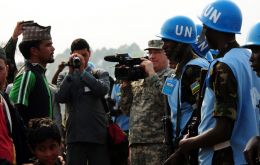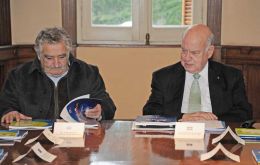MercoPress. South Atlantic News Agency
Health & Science
-
Thursday, August 1st 2013 - 03:56 UTC
Uruguay passes bill legalizing marijuana split on party lines; Senate discussion next October

Uruguay's lower house passed a marijuana legalization bill on Wednesday which now must be discussed by the Senate, most probably in October. The vote brings Uruguay one step closer to becoming the first country to legally regulate production, distribution and sale of the drug.
-
Wednesday, July 31st 2013 - 18:13 UTC
Marine antibiotic compound, anthracimycin could help fight new ‘super-bugs’

A completely new and unusual antibiotic compound has been extracted from a marine micro-organism found in sediments off the coast of California. The discovery of genuinely novel antibiotics is rare, and experts say resistance to the drugs poses a grave threat to human health.
-
Wednesday, July 31st 2013 - 17:59 UTC
Pfizer agrees to pay 491m dollars to settle illegal marketing of Rapamune

US drug-maker Pfizer has agreed to pay 491 million dollars to settle a probe into illegal marketing of a drug by Wyeth, a firm it had acquired in 2009. The case revolved around Rapamune, a drug prescribed to prevent rejection of transplanted kidneys.
-
Wednesday, July 31st 2013 - 05:54 UTC
FAO calls for withdrawal of highly hazardous pesticides in developing countries

The tragic incident in Bihar, India, where 23 school children died after eating a school meal contaminated with monocrotophos, is an important reminder to speed up the withdrawal of highly hazardous pesticides from markets in developing countries, the UN Food and Agriculture Organization (FAO) said on Tuesday.
-
Friday, July 26th 2013 - 06:25 UTC
Panel of scientists blames UN for cholera deadly epidemic in Haiti

A group of international scientists studying a deadly cholera epidemic in Haiti has concluded that peacekeepers from the United Nations were the most likely source of the disease. The epidemic, which began in late 2010, has so far claimed over 8,000 lives. The UN formally rejected compensation claims in February.
-
Thursday, July 25th 2013 - 06:01 UTC
Uruguay expects to launch its first broadcasting and infrared info satellite in 2014

The first satellite of the Uruguayan AntelSat project will be launched at the beginning of 2014, according to the country's telecom authority Antel.
-
Thursday, July 25th 2013 - 02:51 UTC
Coastal Antarctic permafrost melting faster than expected

For the first time, scientists have documented an acceleration in the melt rate of permafrost, or ground ice, in a section of Antarctica where the ice had been considered stable. The melt rates are comparable with the Arctic, where accelerated melting of permafrost has become a regularly recurring phenomenon, and the change could offer a preview of melting permafrost in other parts of a warming Antarctic continent.
-
Thursday, July 25th 2013 - 02:41 UTC
H1N1 influenza has claimed the lives of 38 people in Argentina

The H1N1 Influenza A virus has claimed the lives of 38 people so far this year in Argentina, a regional health official said this week, following the confirmation of two more deaths in the western province of San Juan.
-
Tuesday, July 23rd 2013 - 17:22 UTC
Cardiovascular diseases remain number one cause of death, says WHO

Cardiovascular diseases remain the number one cause of death throughout the world, and killed nearly 17 million people in 2011, that is 3 in every 10 deaths. Of these, 7 million people died of ischemic heart disease and 6.2 million from stroke, reports the World Health Organization.
-
Tuesday, July 23rd 2013 - 07:39 UTC
Mujica praises the OAS and the report on the drug problem in the Americas

The Organization of American States (OAS), Secretary General José Miguel Insulza, presented on Monday Uruguayan president José Mujica the Report on the Drug Problem in the Americas, prepared by the hemispheric institution following a mandate of the Sixth Summit of the Americas.